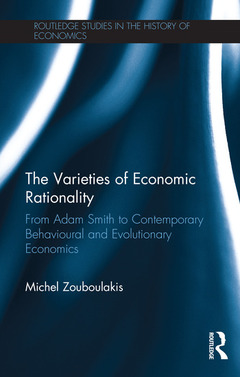The Varieties of Economic Rationality From Adam Smith to Contemporary Behavioural and Evolutionary Economics Routledge Studies in the History of Economics Series
Auteur : Zouboulakis Michel

The concept of economic rationality is important for the historical evolution of Economics as a scientific discipline. The common idea about this concept -even between economists- is that it has a unique meaning which is universally accepted. This new volume argues that "economic rationality" is not not a universal concept with one single meaning, and that it in fact has different, if not conflicting, interpretations in the evolution of discourse on economics. In order to achieve this, the book traces the historical evolution of the concept of economic rationality from Adam Smith to the present, taking in thinkers from Mill to Friedman, and encompassing approaches from neoclassical to behavioural economics.
The book charts this history in order to reveal important instances of conceptual transformation of the meaning of economic rationality. In doing so, it presents a uniquely detailed study of the historical change of the many faces of the homo oeconomicus .
Introduction: Why is rationality so important to economists? 1: Adam Smith and the concept of morally constrained rationality 2: John Stuart Mill and the concept of socially embedded rationality 3: William Stanley Jevons and the concept of substantive rationality 4: Vilfredo Pareto and the idea of rationality as consistency of choices 5: Lionel Robbins, scarcity, consistency and rationality 6: Neoclassical rationality under fire: the empiricist critique 7: Three conventionalist responses. Machlup, Samuelson and Friedman 8: Popper’s conventionalist retreat 9: Game theory introduces strategic rationality 10: Herbert Simon and the concept of bounded rationality 11: Rationality in behavioral economics 12: The social individuals’ rationality Conclusion: Who is rational after all?
Michel S. Zouboulakis is Professor of History & Methodology of Economics at the University of Thessaly, Greece.
Date de parution : 01-2014
13.8x21.6 cm
Thème de The Varieties of Economic Rationality :
Mots-clés :
rationality; Adam Smith; Contempoary behavioural economics; evolutionary economics; economics; Follow; Keynes; Held; Indifference Curves; Unlimited; Complete Preordering; General Optimum Solution; Social Optimum Solution; Homo Oeconomicus; Warp; Violate; Limited Computational Capacity; Hypothetico Deductive Model; Maximization Principle; Ideal Type Construction; Neoclassical Research Program; Inclined; MRS; Bernoulli; Mankind; Nonlogical Actions; NLA; Subjective Expected Utility Theory; Eighth Century Bc; Perfect Expectation



